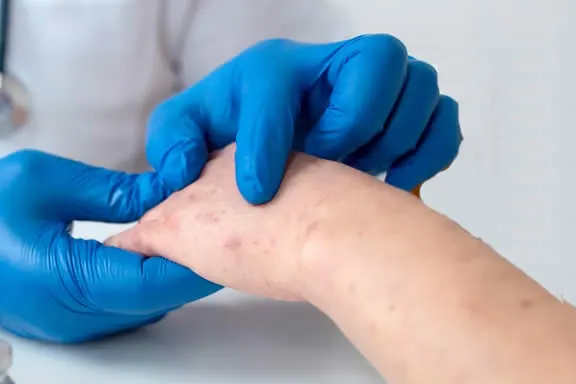What is Contact Dermatitis?
Contact dermatitis is a skin condition that occurs when your skin comes in contact with a substance that causes an allergic or irritant reaction. It can cause symptoms such as itching, redness, swelling, blisters, dryness, and cracking. Contact dermatitis is not contagious, but it can be uncomfortable and sometimes painful.

What are the signs and symptoms of Contact Dermatitis?
Some common symptoms are:
- Itchiness, which can range from mild to intense
- Redness, which can be more noticeable on lighter skin tones
- Dryness, which can make the skin feel rough and cracked
- Blisters, which can be small and fluid-filled or large and oozing
- Burning, which can be a sensation of heat or pain on the affected area
- Swelling, which can affect the skin or the nearby tissues
Contact dermatitis usually affects the area of skin that came in contact with the substance, but it can also spread to other parts of the body. The symptoms may appear within minutes to hours of exposure, or they may take days to weeks to develop.
What are the causes of Contact Dermatitis?
There are two main types of contact dermatitis: irritant contact dermatitis and allergic contact dermatitis.
- Irritant contact dermatitis is caused by a substance that directly damages the outer layer of skin, such as soap, detergent, solvent, or acid. The severity of the reaction depends on how long and how often the skin is exposed to the irritant. Irritant contact dermatitis is more common than allergic contact dermatitis.
- Allergic contact dermatitis is caused by a substance that triggers an immune system response in the skin, such as nickel, latex, perfume, or cosmetics. The reaction usually occurs after repeated or prolonged exposure to the allergen. Allergic contact dermatitis is less common but can be more severe than irritant contact dermatitis.
What treatments are available at the dermatologist for Contact Dermatitis?
Some treatments that are available at the dermatologist for contact dermatitis are:
- Steroid creams or ointments. These are applied to the skin to help soothe the rash. You might apply prescription topical steroids, such as clobetasol 0.05% or triamcinolone 0.1%.
- Pills. In severe cases, your dermatologist may prescribe pills you take by mouth (oral medications) to reduce swelling, relieve itching or fight a bacterial infection.
- Patch testing. This is a test to identify the cause of your rash by applying small amounts of potential allergens on your skin and checking for reactions.
- Antihistamine drugs. These are drugs that can help reduce itching and allergic reactions by blocking the effects of histamine, a chemical released by your immune system.

FAQ About Contact Dermatitis
What are the complications and risks of contact dermatitis?
Contact dermatitis is a skin condition that occurs when your skin comes in contact with a substance that causes an allergic or irritant reaction. It can cause symptoms such as itching, redness, swelling, blisters, dryness, and cracking.
What are some common substances that can cause contact dermatitis?
Some common substances that can cause contact dermatitis are Irritants & Allergens
What are some natural or alternative remedies for contact dermatitis?
Some natural or alternative remedies for contact dermatitis are Coconut oil , Aloe vera , Oatmeal , Neem , Baking soda , Olive oil & Apple cider vinegar.
How can contact dermatitis affect your quality of life and mental health?
These symptoms can affect your quality of life and mental health in several ways like Physical discomfort, Social stigma, Emotional distress & Low self-esteem.
Is there a dermatologist near me in Kansas City that offers treatment for contact dermatitis?
Yes. At our Kansas City dermatology office we offer treatment for contact dermatitis to patients from Kansas City and the surrounding area. Contact our office today to schedule an appointment.

